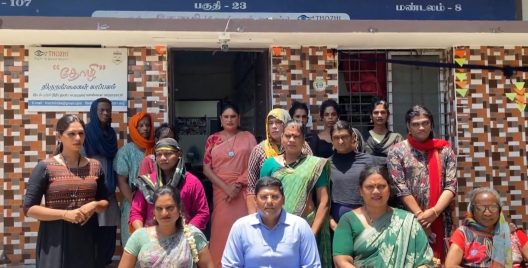By Juliana Sridhar
The simple meaning of the term Cybercrime means a computer oriented crime. Wikipedia defines Cybercrime as “offences that are committed against individuals or groups of individuals with a criminal motive to intentionally harm the reputation of the victim or cause physical or mental harm or loss to the victim directly or indirectly using modern telecommunication networks such as internet and mobile phones.” The criminals who perform these illegal activities are referred to as hackers or cybercriminals.
To get an in depth study of the subject, here is an interview with N.S. Nappinai, who is a Supreme Court Advocate and founder of Cyber Saathi. Nappinai is a renowned lawyer with 29 years of experience in Constitutional, Criminal, IPR and Cyberlaws. She is the advisor to the Maharashtra Cyber Police and a Senior Panel Advocate for Central and Western Railway of the Government of India. She is also a prolific writer and contributes to leading publications. She has authored the seminal book on cyberlawstitled “ Technology Laws Decoded” .Her book on Cyber Safety and Emerging Technologies is forthcoming in latter half of 2020. Nappinai is an alumnus Of Stanford CDDRL, CheveningU.K. and IVLP, U.S.A. She trains judges, police, armed forces and intelligence agencies at National and State Academies. And that is not all, she is also a sought after speaker at National and International Conferences. She is also part of the government committees dealing with cyberlaws.

Here is the list of my questions along with the answers given by her.
Cybersaathi.org was set up for this very purpose. I believe that empowering public through knowledge is the best preventive and protective measure. For once they get to know about cybercrime trends and modes and manner of committing such crimes, they will be more alert. The various threats like cyber bullying, cyber stalking, financial frauds like credit/debit card frauds, digital wallet frauds, phishing attacks etc impact all individuals. It is therefore very important for people to know about these threats on digital domains and be alert.
My Cyber Saathi website is a not for profit initiative is intended to help everyone in this cause. The precautions to be taken are
Can you give us the basic description of Cybercrime?
Cybercrime is not defined in the Information Technology (amendment) Act, 2000. I have referred to cybercrime in my book “Technology Laws Decoded “as a category of offences committed using computers or computing devices as a source or weapon. Hence any act involving computers or devices which is made punishable by law would amount to cybercrime.
Firstly, victims should know that cyber bullying is a criminal offence and that the offenders can be traced and justice rendered. The Ministry of Home Affairs has set up a portal for reporting cybercrimes- cybercrime.gov.in. Apart from this, victims may also file a complaint in the local police station or at the cybercrime cells set up in their respective jurisdictions. There are also State online sites set up by the police as well as cybercrime cells.

Does trolling on social media come under the purview of cybercrime?
It could. The wordings used and the mode and manner of the commission of this act would determine if it comes under the purview. In many cases, of trolling of women, sexually explicit content is used. Depending on the severity of the language used, criminal provisions can be invoked under the Indian Penal Code and the Information Technology Act.
It is important that victims seek their remedies at the earliest so that the criminals do not get emboldened to increase the intensity of their attack. Moreover cyber bullies can be tracked down in most cases.
Stalking is basically an offence under the Indian Penal Code. When a man stalks a woman, it is an offence while the reverse is not. Cyber stalking is not a separate offence but is part of the above provision. Only thing is here the stalking is done through internet, email or other forms of electronic communication. Women have to take basic precautions like not sharing their personal mobile numbers with strangers. Violations should be reported at the earliest and the help of the police or the National Commission of Women can be sought. Here, the victim should not feel that they have done wrong. Even if there had been a prior relationship, it is still a crime as the law does not permit a man to stalk a woman.
Due to the coronavirus pandemic, most transactions are done online. Can you list out some general precautions one needs to take.?
Firstly, Covid 19 has increased cybercrimes. Cases are mostly of malware getting downloaded through websites and apps. Criminals jump onto trends very fast, hence this immediate series of crimes during this period. Apart from this, phishing attacks, financial frauds including claims of updating KYC details and using these details to get hold of OTP’s and clearing out bank accounts are some offences doing the rounds.
Beware of phishing and vishing attacks, calls, emails, SMSes and Whatsappmessages threatening you with closure or blocking of bank accounts if you do not complete KYC. It is always safe to deal with banks through the same channel that you used to earlier. In any case, do not share your OTP with anyone. No bank asks for this.

Downloading of Apps is said to be risky. How will a person know which apps are safe?
The onset of the current pandemic has increased cybercrime drastically. Cybercriminals have developed a “coronavirus map” which is a malware used to steal confidential data of people who download the same and access it. It includes their banking information, email account details and passwords.
First check if you really need the App. Check your App Store as the first level check on the veracity of the App. Next check what it seeks permission for. If there is access to your camera, microphone, etc, then pause before you download. Also check out the source of the App. Most of all exercise restraint and caution.
True but this is a trend that will continue for some more time. A lot of webinars are also taking place. For online classes, the concerned schools/colleges have to take precautions in the choice of platform, security measures and vulnerabilities if any. They have to check if the platform requires downloading of an app or if children’s data is being collected.
The reliance on digital options right from shopping to payments have opened up many opportunities not only for technology companies but also for criminals. Moreover, this is a domain which everyone is not familiar with. Hence cybercriminals followpopular trends and have made it their playfield.
What is the procedure to lodge a complaint ?
A victim should put together all details and supporting documents before giving a complaint. They have to identify the jurisdiction of the police station if they are giving the complaint in person. If they choose the online option – the cybercrime.gov.in portal, the site will ask for all the details.
Is it difficult to investigate cybercrime as it crosses international boundaries?
This is an issue that is still simmering and countries across the world have to break impasse and harmonize the laws. This would help cross border enforcement. For now, we rely on mutual legal assistance treaties and agreements between countries and extradition laws. In fact I have dedicated an entire chapter in my book to this issue. India has extra territorial jusrisdiction but enforcing it is a nightmare.
Would you like to convey a message to our readers?
Get empowered through knowledge of cybercrime and remedies available. Ignorance creates fear and this fear will be made use of by criminals to make a person fall victim and start the extortion process. I would like to give one strong message and that is to take action. The system may not be perfect but perseverance will help the victims to get justice.














